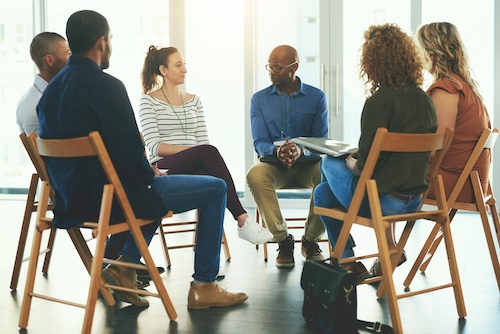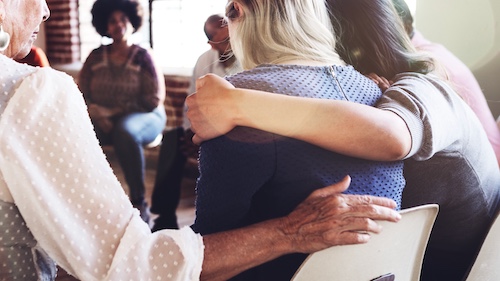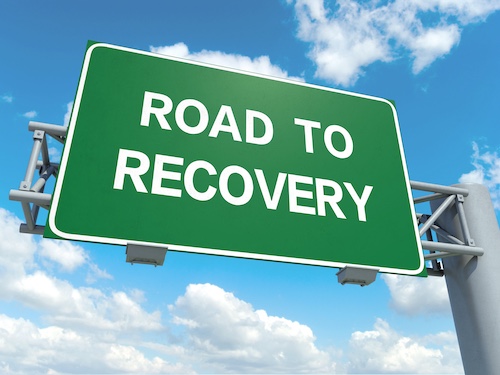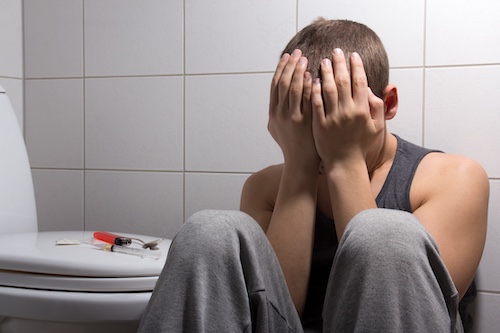Support Groups in Raleigh: Building Connection and Lasting Recovery
Support groups in Raleigh give people a place to share experiences, learn coping strategies, and find strength through community. These groups provide emotional support and practical tools for managing mental health and recovery. Whether meeting in person or through virtual groups, members gain understanding, build healthy relationships, and develop self-awareness in a safe space.
Carolina Recovery in Raleigh helps individuals connect with group therapy sessions and skills groups that promote healing, balance, and long-term personal growth.
Why Support Groups Matter for Mental Health and Recovery
Support groups create a space where people share experiences, gain perspective, and build healthier habits. They play an essential role in mental health and recovery by connecting group members in a supportive environment.
Shared Understanding and Emotional Support
In a support group, people who face similar challenges come together to talk and listen. Each person brings personal insight that helps others feel understood. This shared experience reduces isolation and encourages self-awareness. Group members often find strength in knowing they are not alone. The emotional support gained in these sessions can ease stress and promote steady mental health.
Building Coping Strategies and Skills
Support groups help individuals learn coping strategies and self-care habits that strengthen recovery. Many sessions focus on skills such as emotion regulation, distress tolerance, and interpersonal effectiveness. These are often taught in structured settings like dialectical behavioral therapy or skills group training. Consistent practice helps improve daily functioning and strengthens healthy relationships.
A Safe Space for Growth and Feedback
A well-led group offers a safe space where members can express feelings without judgment. Group therapy sessions are designed to allow open communication and honest feedback. This environment helps members build trust, develop understanding, and improve communication skills. Whether in person or through virtual groups, this structure supports both mental and physical health.
Connection with Professional and Community Resources
Support groups often link members to nonprofit organizations and licensed therapists. Many are part of larger education and recovery programs that provide guidance and ongoing support. Carolina Recovery in Raleigh offers group therapy sessions that align with these principles, helping clients gain structure, skills, and a sense of belonging. Through these programs, participants can continue personal growth in a secure and encouraging setting.
Types of Support Groups in Raleigh
Raleigh offers many support groups that focus on mental health, recovery, and personal growth. Each group provides a supportive environment where members can share experiences, learn coping strategies, and build emotional strength.
Mental Health Support Groups
Mental health support groups help people manage anxiety, depression, bipolar disorder, and other emotional challenges. These groups give members a safe space to talk openly and receive understanding from others who share similar experiences. Many local organizations, such as NAMI Wake County, host in-person and virtual groups that focus on education, emotional support, and skill development. Participants learn how to manage stress, improve communication, and maintain healthy relationships.
Substance Use and Recovery Groups
Raleigh has several recovery-based support groups that focus on addiction treatment and long-term sobriety. These include Alcoholics Anonymous, SMART Recovery, and Celebrate Recovery. Group members work together to develop coping strategies, build accountability, and strengthen emotional health. Carolina Recovery in Raleigh supports this process with group therapy sessions that integrate evidence-based methods such as dialectical behavioral therapy and cognitive behavioral therapy. This approach helps clients gain stability and confidence while maintaining recovery.
Skills and Therapy-Focused Groups
Some groups focus on structured therapy and skill development. Skills groups may teach distress tolerance, emotion regulation, and interpersonal effectiveness. Group therapy sessions often follow a clear focus that promotes self-awareness and behavior change. Licensed therapists guide members through exercises that support personal growth and improve mental health. These groups are effective for individuals seeking long-term emotional balance.
Virtual and Hybrid Support Groups
Many Raleigh organizations now offer virtual groups for people who prefer remote participation. Online group sessions provide the same supportive environment found in person. They are ideal for those managing busy schedules or limited mobility. Using a secure online platform ensures privacy and safety, protecting each session from online attacks or malformed data. Carolina Recovery also offers virtual therapy groups, giving clients flexible access to consistent emotional support and professional guidance.
How to Find and Join Support Groups in Raleigh
Finding the right support group in Raleigh can help you build connections, emotional support, and personal stability. The process is simple when you know where to look and what to expect.
Identify Your Goals and Group Focus
Start by identifying what you want to gain from joining a group. Some support groups focus on mental health challenges like anxiety or depression, while others address addiction recovery, family support, or skills training. Knowing your goals helps you choose a group that fits your needs. Look for groups that match your focus areas, such as dialectical behavioral therapy, coping strategies, or interpersonal effectiveness.
Research Trusted Directories and Organizations
Use trusted online directories such as NAMI Wake County and Psychology Today to find verified support groups in Raleigh. These listings include in-person and virtual groups, group therapy sessions, and skills group programs led by licensed professionals or nonprofit organizations. You can also visit Carolina Recovery’s website to explore therapy options available at their Raleigh recovery center. Their programs connect clients with safe, structured groups designed for both mental health and recovery support.
Review Group Details Before You Join
Before joining, read the group description carefully. Pay attention to details such as meeting times, session format, and group aims. Some groups are education-based, while others are therapy-focused or peer-led. Make sure the group offers a supportive environment that aligns with your comfort level. You can email the site owner or facilitator to ask questions about the group’s structure and focus.
Attend Your First Session
Once you find a group that meets your needs, register and attend your first session. Bring an open mindset and be ready to share experiences respectfully. The first meeting helps you understand the group’s flow and expectations. Consistent attendance helps you build trust, receive feedback, and develop healthy habits for emotional growth.
Protect Your Privacy and Online Security
When joining a virtual group, confirm that the platform uses a security service to protect itself from online attacks. Avoid submitting a certain word or phrase that could trigger this block or cause access issues. Make sure your connection is private and stable. This ensures your personal data is safe and that your focus stays on recovery and growth, not on technical problems.
Connect with Professional Support
If you need structured help, Carolina Recovery in Raleigh offers group therapy sessions guided by licensed clinicians. These programs combine mental health treatment with community support. Joining a Carolina Recovery group provides consistent care, emotional connection, and a secure environment where you can continue personal progress with professional guidance.
Carolina Recovery’s Role in Group Therapy and Recovery Support
Carolina Recovery in Raleigh provides structured support groups that help individuals strengthen mental health, build coping skills, and maintain long-term recovery.
Group Therapy as a Core Part of Treatment
Group therapy is a central part of Carolina Recovery’s treatment approach. Each group session gives members a safe space to share experiences and learn from others. Licensed clinicians lead discussions that focus on emotional support, self-awareness, and communication. This group setting promotes understanding, feedback, and personal growth while helping members form healthy relationships that reinforce recovery.
Evidence-Based Group Methods
Carolina Recovery uses evidence-based therapy methods such as dialectical behavioral therapy and cognitive behavioral therapy. These sessions teach practical skills including distress tolerance, emotion regulation, and interpersonal effectiveness. Members practice applying these techniques in real situations, improving how they respond to stress and build stability. The structured format helps each person develop confidence and a sense of control.
Skills Groups for Lasting Change
Skills groups at Carolina Recovery focus on training that supports long-term mental and physical health. Each group aims to help members manage daily challenges, create balance, and maintain focus on recovery. By practicing coping strategies together, participants strengthen habits that lead to consistent progress. These sessions also support self-care and positive connection with others.
Supportive and Secure Environment
Every session at Carolina Recovery takes place in a supportive environment that protects privacy and promotes emotional safety. Whether attending in person or through virtual groups, members experience a sense of belonging that helps reduce stress and isolation. The recovery center uses secure systems to protect information and ensure that group interactions remain private. This safe space allows individuals to focus fully on healing and growth.
Continuous Care and Community Connection
Carolina Recovery connects group members with community resources and nonprofit organizations that extend support beyond therapy. These partnerships give individuals access to education, continued treatment, and additional support networks. By combining structured group therapy with community engagement, Carolina Recovery helps people build lasting recovery and stable emotional health.
Carolina Recovery’s Role in Group Therapy and Recovery Support
Carolina Recovery in Raleigh provides structured support groups that help individuals strengthen mental health, build coping skills, and maintain long-term recovery.
Group Therapy as a Core Part of Treatment
Group therapy is a central part of Carolina Recovery’s treatment approach. Each group session gives members a safe space to share experiences and learn from others. Licensed clinicians lead discussions that focus on emotional support, self-awareness, and communication. This group setting promotes understanding, feedback, and personal growth while helping members form healthy relationships that reinforce recovery.
Evidence-Based Group Methods
Carolina Recovery uses evidence-based therapy methods such as dialectical behavioral therapy and cognitive behavioral therapy. These sessions teach practical skills including distress tolerance, emotion regulation, and interpersonal effectiveness. Members practice applying these techniques in real situations, improving how they respond to stress and build stability. The structured format helps each person develop confidence and a sense of control.
Skills Groups for Lasting Change
Skills groups at Carolina Recovery focus on training that supports long-term mental and physical health. Each group aims to help members manage daily challenges, create balance, and maintain focus on recovery. By practicing coping strategies together, participants strengthen habits that lead to consistent progress. These sessions also support self-care and positive connections with others.
Supportive and Secure Environment
Every session at Carolina Recovery takes place in a supportive environment that protects privacy and promotes emotional safety. Whether attending in person or through virtual groups, members experience a sense of belonging that helps reduce stress and isolation. The recovery center uses secure systems to protect information and ensure that group interactions remain private. This safe space allows individuals to focus fully on healing and growth.
Continuous Care and Community Connection
Carolina Recovery connects group members with community resources and nonprofit organizations that extend support beyond therapy. These partnerships give individuals access to education, continued treatment, and additional support networks. By combining structured group therapy with community engagement, Carolina Recovery helps people build lasting recovery and stable emotional health.
Start Your Recovery Journey with Carolina Recovery!
If you are ready to find strength through connection, our team at Carolina Recovery in Raleigh is here to help. We offer group therapy sessions and support groups that focus on mental health, emotional healing, and long-term recovery. Each session provides a supportive environment where you can share, learn, and grow alongside others who understand your challenges.
Schedule an appointment with us today at (812) 408-8842!







